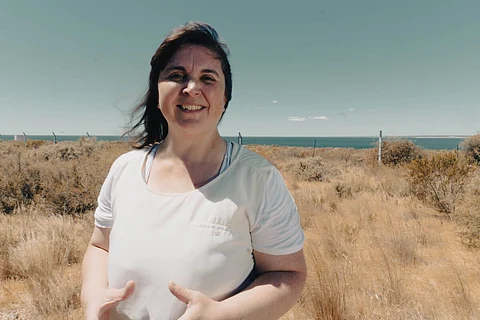

Dr. Tamara Rubilar's scientific career began with studying echinoderms and more specifically sea urchins and sea cucumbers. While she attended congresses and conferences, she verified how these species usually are "heavily exploited" worldwide.
Now, she works in a research center that focuses on the use of marine resources and confirms that overfishing is an issue that is always present.
This is because aquaculture presents a lack of commercial feed, farming systems, and knowledge of many of its biological aspects. All this encouraged her to take a step forward.
Therefore, Tamara has specialized in sea urchin aquaculture focused on generating unfertilized roe to make nutraceutical products.
"We develop aquaculture technology, specific to the requirements of sea urchins, and we do biotechnology so sea urchins can generate eggs every 2 months," she explains.
On the contrary, this generation of roe by nature is done just once a year. With this new technology, there are 500 times more spinochromes.
Spinochromes are molecular derivatives of pigments found in various marine species, mainly sea urchins. More specifically, these are found in spines and shells.
In more detail, Tamara indicates that "these spinochromes are specific molecules of echinoderms, which are the most powerful antioxidant of marine origin."
According to the scientific, these have been studied for more than 30 years and are proven to have clear benefits for human health.
"We harvest the roe and make extracts with green technology (we do not use any type of organic solvent) to generate formulations specifically designed to improve human health," she highlights.
On the other hand, Tamara encourages us to face possible failures and the need to overcome them.
In the past, she and her team had to reorganize the first farming system they designed. In other words, they did not achieve adequate palatability in the first feed formulation.
"Failure is part of scientific and productive activity. Many times, the things that you design or plan do not turn out as you think. Trying again is part of the process," she stresses.
Likewise, she recalls the barriers that regulatory parameters sometimes impose. "In our country, aquaculture is not very widespread. So, we need to be persistent in generating all the activity approvals."
To meet the requirements of the circular economy and environmental and social responsibility, Tamara resorts to a change of mentality in the industry with the help of society and governments.
As an example, she develops: "The lobster industry in my province generates thousands of tons of waste. For this reason, along with our investors, we begin a process of reuse. We use this waste in our production processes. Also, we work to generate value-added products for the aquaculture and human industries."
Furthermore, we must underline that Tamara as a scientific and entrepreneurial woman has had to face great challenges. "I worked hard on my leadership because successfully combining a scientific with a technical team requires a lot of commitment and energy."
"I guess I faced similar difficulties as other women. The experience that marked me the most -now positive in the long run- was when I got pregnant. I was invited to find another University and Laboratory to finish my thesis," she alerts.
However, she focuses again on the positive side: "It was hard, I was delayed by a whole year, but it pushed me to the current path. Is success more difficult for a woman? I think so, we must work more and present results before they take us seriously."
Tamara is currently part of the Aquaculture Strengthening Network and other important organizations on aquaculture based in her mother country, Argentina.
To conclude, we asked the doctor how important it is for her to create and develop a good working team. "Human relationships move the world, and it is necessary to develop and generate a sense of belonging and team," she accentuates.
Persistently, she works with aquaculture technicians, engineers, doctors, students, administrative staff, and private sector investors.
In her entrepreneurial journey, she has been always accompanied by the Secretary of Science and Technology of her locality, through the Ministry of Production with the Directorate of Fauna and Flora, the Ministry of Health with the Department of Bromatology, and even the Municipality from Puerto Madryn.
"That is key, accompaniment, development, and support. Thereby, a disruptive and innovative venture can reach the market," she concludes.
Promarine Antioxidants® is the first technology-based startup in Patagonia, Argentina. It has the support of The National Scientific and Technical Research Council (CONICET).
With more than twenty years of experience in marine research, it promotes major innovations in the development and application of non-extractive, productive aquatic models, applying marine resources.
Through scientific research and the use of aquaculture biotechnology, it can enhance the healing, protective and reinforcing characteristics of the immune system of the sea urchin antioxidants, obtaining an effective and powerful active that acts at the cellular level and brings great benefits to the cosmetic and food industry.
